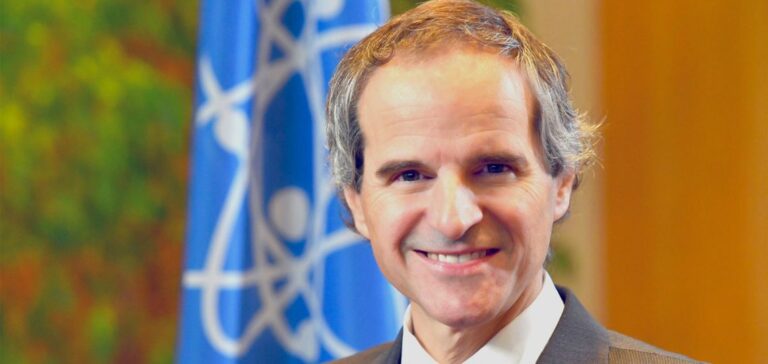The head of the International Atomic Energy Agency (IAEA) denounced “deliberate and targeted” shooting at the nuclear power plant in Zaporijjia, the largest in Europe, calling for “stop this madness”.
Russia and Ukraine have again accused each other of having bombed this nuclear power plant located in southern Ukraine and occupied militarily by the Russian army.
Kiev also denied having executed several Russian soldiers who had gone there.
“Explosions have taken place at the site of this major nuclear power plant, which is completely unacceptable,” said Rafael Grossi, in an interview with the French channel BFMTV.
“Whoever is doing this, it has to stop immediately,” the IAEA chief urged, insisting, “The people who are doing this know where they are hitting. This is absolutely deliberate, targeted.”
For several months, Moscow and Kiev have accused each other of bombing the site, which is close to the front line.
“A good dozen” strikes targeted the plant this weekend, from Saturday to Sunday, some of which were witnessed by IAEA experts, the agency said in a statement.
Its leader considered the situation “extremely serious”, without attributing responsibility to Russian or Ukrainian forces.
“The plant is on the front line, there are military activities very difficult to identify, there are Russian and Ukrainian personnel in operation,” recalled Grossi.
For the Russian Ministry of Defense, “the Kiev regime does not stop provocations to create the threat of a disaster at the Zaporizhia nuclear power plant.
On Saturday and Sunday, Ukrainian forces fired more than 20 “large-caliber shells” at the plant, the ministry statement said.
They exploded between the energy blocks number 4 and 5 and targeted the roof of a “special building” located near these blocks, according to the same source.
This “special building” houses a nuclear fuel depot, said an official of the Russian nuclear power producer Rosenergoatom, Renat Kartchaa, quoted by the official Russian agency TASS.
Despite these bombings, “the level of radiation in the area of the plant remains within the norm,” said the statement of the Russian Ministry of Defense.
Nuclear blackmail
For its part, the Ukrainian nuclear agency accused Russia of bombing the site of the plant.
“This morning of November 20, 2022, as a result of numerous Russian bombings, at least 12 strikes were recorded on the site of the Zaporijjia nuclear power plant,” Energoatom said, accusing the Russians of “once again organizing nuclear blackmail and putting the whole world at risk.”
“There are those who consider a nuclear power plant to be a legitimate military target, which is unbelievable,” said the IAEA Director General.
The IAEA, which has two inspectors on site at the plant, is conducting an assessment.
“There was damage in some rather delicate places,” Grossi said, noting that the reactors had not been affected but “rather the area where the fresh and spent fuel are located.”
“We expect to be able to do a survey tomorrow (Monday) morning very early,” he added, noting that inspectors had not been able to go out Sunday because the situation was too dangerous.
French President Emmanuel Macron held talks on Sunday with the head of the IAEA on the situation at the Zaporizhia plant and “will probably speak” to Ukrainian President Volodymyr Zelensky, according to the French presidency.
Kherson under the Russian shells
In his daily address, Ukrainian President Volodymyr Zelensky said that nearly 400 Russian attacks took place in the east of the country on Sunday alone.
In the south of the country, in Kherson, which Ukrainian troops recently recaptured, the inhabitants were confronted with Russian shelling after eight months of occupation.
After the Russian army, which was thrown across the river, shelled the industrial area and set fire to an oil depot not far from their building, Yuri Mosolov and his wife decided that it was time to leave.
“After yesterday’s bombings, my wife said +Let’s not take too many risks, let’s leave,” Mosolov explained.
Meanwhile, Ukraine on Sunday rejected Russian accusations that it “brutally” killed Russian soldiers who had laid down their arms, which Moscow called a “war crime.”
The Ukrainian army said it had verified the authenticity of the videos, which Moscow said proved that Kiev had executed a dozen Russians.
But excerpts from the videos show that Russian forces pretended to surrender and opened fire on Ukrainian soldiers in a “false surrender,” Dmytro Lubinets, a human rights commissioner in the Ukrainian parliament, argued Sunday.
He considered that in this case the Russians “can not be considered prisoners of war” and “to retaliate is not a war crime.
AFP could not independently confirm these videos.
However, a UN spokesman told AFP on Friday that the international organization was “aware of these videos” and that it was “examining them”.
Russia, which has been conducting an offensive in Ukraine since February 24, is militarily occupying the territory of the plant. Russian President Vladimir Putin has claimed the annexation, as well as four Ukrainian regions.





















